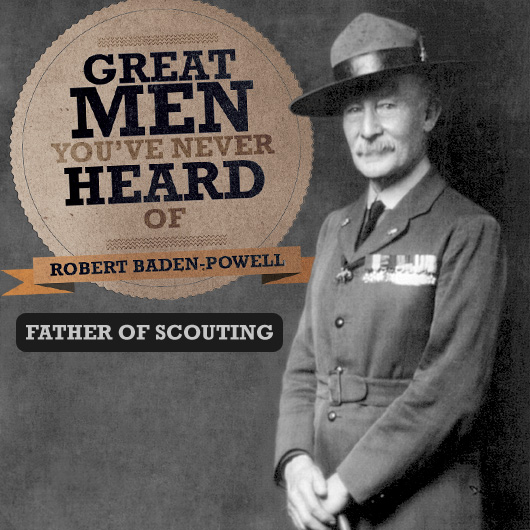Hey folks. I realize that the little blurb about me down the bottom doesn't tell you a whole lot about me. So here is some full disclosure: I am an Eagle Scout. I have been involved in scouting since I was in Tiger Cubs, at about age 7, all through Cub Scouts, into Boy Scouts, and eventually became an Eagle Scout. Now at age 26, I still head down every year to my Troop's Summer Camp and teach Archery Merit Badge. I have also been working at a Cub Scout summer camp for over 10 years. With the exception of my father, and my Scoutmaster, no single man's ideals and beliefs have had such a profound impact on the man that I have become as Lord Baden-Powell.
Born Robert Stevenson Smyth Powell on February 22, 1857 to Reverend Baden Powell, a Professor of Geometry at Oxford University, and Henrietta Grace Smyth. Following the death of his father in 1860 his mother changed the family name to Baden-Powell. Subsequently, Stephe, as he was called, was raised by his mother, a strong woman who was determined that her children would succeed.
Baden-Powell would say of her in 1933 “The whole secret of my getting on, lay with my mother.” He was awarded a scholarship to Charterhouse, a prestigious public school. It was here that he was first introduced to Scouting skills through hunting and cooking wild game while avoiding teachers because the woods were strictly out of bounds. He was not just a rough and tumble outdoorsman, he also played the piano and violin, was an ambidextrous artist, and also enjoyed acting.
In 1876, Baden-Powell joined the military in the 13th Hussars in India with the rank of Lieutenant. He enhanced his military scouting skills amidst the Zulu in the early 1880's in South Africa. He was posted in Malta for three years working as an intelligence officer. Baden-Powell frequently traveled disguised as a butterfly collector, incorporating plans for military installations into his drawings of butterfly wings.
In 1896, he returned to South Africa to aid the British South Africa Company colonials who were under siege during the Second Matabele War. It was here that many of his Boy Scouting ideas took root. During this campaign Baden-Powell befriended an American scout named Frederick Russell Burnham, who introduced him to the American Old West and to woodcraft (i.e. scoutcraft). This was also when Baden-Powell first donned his signature Stetson campaign hat and kerchief.
He was sent all over Africa before returning to South Africa prior to the Second Boer War. Here he was trapped in the Seige of Mafeking. During the seige, the Mafeking Cadet Corps, a group ofboys below fighting age, were used to stand guard, carry messages, and assist in hospitals, thereby freeing up the men to fight. Even though he did not form this group nor is there any evidence that he took much notice of them during the Siege, he was impressed by them and used them as an object lesson in the first chapter in Scouting For Boys.
In 1899 Baden-Powell wrote a military training manual, Aids to Scouting. Upon his return from Africa, in 1903, he found that it had become quite popular and was being used by teachers and youth organizations. In August of 1907 he held a camp on Brownsea Island for local Boys' Brigades, a Christian youth organization, and some of his friends' sons. This was done to test his ideas for a revised version of his Aids to Scouting designed for younger audiences, Scouting for Boys, which was published in 1908. It was from here that Scouting started.
In January 1912, Baden-Powell met Olave St. Clair Soames, a woman who later became his wife. In 1939, he and his wife moved to Nyeri, Kenya. He passed away on January 8, 1941 and is buried in St. Peter's Cemetery in Nyeri. His grave stone bears a circle with a dot in it which is the trail sign for “Going home.” When his wife died, her ashes were sent to Kenya to be interred beside her husband. Kenya has declared Baden-Powell's grave a national monument.
So the next time you are at the pub, in the cafeteria, or even by yourself, call for some quiet, and raise a glass of your preferred beverage to Lord Baden-Powell, the founder of the worldwide scouting movement.
|















![It’s Time to Begin Again: 3 Uncomfortable Frameworks That Will Make Your New Year More Meaningful [Audio Essay + Article]](https://www.primermagazine.com/wp-content/uploads/2025/01/begin_again_feature.jpg)
